- Home
- Stephen R. Donaldson
Lord Foul's Bane Page 13
Lord Foul's Bane Read online
Page 13
"Why? Who sets them up?"
"The Lords caused them to be made. Revelstone is only one place, and the people live in many therefore the Lords sought a way to help travelers, so that people might come to Revelstone and to each other more easily."
"Well, who takes care of them? There's fresh food here."
Atiaran sighed again, as if she found talking to him arduous. The night had deepened; he could see nothing of her but a shadow as she explained tiredly, "Among the Demondim-spawn that survived the Desolation, there were some who recalled Loric Vilesilencer with gratitude. They turned against the ur-viles, and asked the Lords to give them a service to perform, as expiation for the sins of their kindred. These creatures, the Waynhim, care for the Waymeets -helping the trees to grow, providing food and drink. But the bond between men and Waynhim is fragile, and you will not see one. They serve for their own reasons, not for love of us-performing simple tasks to redeem the evil of their mighty lore."
The darkness in the chamber was now complete. In spite of his irritation, Covenant felt ready to sleep. He asked only one more question. "How did you find this place? Is there a map?"
"There is no map. A Waymeet is a blessing which one who travels accepts wherever it is found-a token of the health and hospitality of the Land. They may be found when they are needed. The Waynhim leave signs in the surrounding land."
Covenant thought he could hear a note of appreciation in her voice which clashed with her reluctance. The sound reminded him of her constant burden of conflicts-her sense of personal weakness in the face of the Land's strong need, her desires to both punish and preserve him. But he soon forgot such things as the image of Waymeets filled his reverie. Enfolded by the smell of the fresh grass on which he lay, he swung easily into sleep.
During the night, the weather changed. The morning came glowering under heavy clouds on a ragged wind out of the north, and Covenant met it with a massive frown that seemed to weigh down his forehead. He awoke before Atiaran called him. Though he had slept soundly in the security of the Waymeet, he felt as tired as if he had spent the whole night shouting at himself.
While Atiaran was preparing breakfast, he took out Triock's knife, then scanned the shelves and found a basin for water and a small mirror. He could not locate any soap-apparently the Waynhim relied on the same fine sand which he had used in Atiaran's home. So he braced himself to shave without lather. Triock's knife felt clumsy in his right hand, and he could not shake lurid visions of slitting his throat.
To marshal his courage, he studied himself in the mirror. His hair was tousled wildly; with his stubbled beard he looked like a rude prophet. His lips were thin and tight, like the chiseled mouth of an oracle, and there was grit in his gaunt eyes. All he needed to complete the picture was a touch of frenzy. Muttering silently, All in good time, he brought the knife to his cheek.
To his surprise, the blade felt slick on his skin, and it cut his whiskers without having to be scraped over them repeatedly. In a short time, he had given himself a shave which appeared adequate, at least by contrast, and he had not damaged himself. With a sardonic nod toward his reflection, he put the blade away in his pack and began eating his breakfast.
Soon he and Atiaran were ready to leave the Waymeet. She motioned for him to precede her; he went ahead a few steps along the path, then stopped to see what she was doing. As she left the chamber, she raised her head to the leafy ceiling, and said softly, "We give thanks for the Waymeet. The giving of this gift honors us, and in accepting it we return honor to the giver. We leave in Peace." Then she followed Covenant out of the copse.
When they reached the open valley, they found dark clouds piling over them out of the north. Tensely, Atiaran looked at the sky, smelled the sir; she seemed distraught by the coming rain. Her reaction made the boiling thunderheads appear ominous to Covenant, and when she turned sharply down the valley to resume her northward path, he hurried after her, calling out, "What's the matter?"
"Ill upon evil," she replied. "Do you not smell it? The Land is unquiet."
"What's wrong?"
"I do not know," she murmured so quietly that he could barely hear her. "There is a shadow in the air. And this rain-! Ali, the Land!"
"What's wrong with rain? Don't you get rain in the spring?"
"Not from the north," she answered over her shoulder. "The spring of the Land arises from the southwest. No, this rain comes straight from Gravin Threndor. The Cavewight Staff wrong-wielder tests his power-I feel it. We are too late."
She stiffened her pace into the claws of the wind, and Covenant pressed on behind her. As the first raindrops struck his forehead, he asked, "Does this Staff really run the weather?"
"The Old Lords did not use it so---they had no wish to violate the Land. But who can say what such power may accomplish?"
Then the full clouts of the storm hit them. The wind scourged the rain southward as if the sky were lashing out at them, at every defenseless living thing. Soon the hillsides were drenched with ferocity. The wind rent at the trees, tore, battered the grass; it struck daylight from the hills, buried the earth in preternatural night. In moments, Atiaran and Covenant were soaked, gasping through the torrent. They kept their direction by facing the dark fury, but they could see nothing of the terrain; they staggered down rough slopes, wandered helplessly into hip-deep streams, lurched headlong through thickets; they forced against the wind as if it were the current of some stinging limbo, some abyss running from nowhere mercilessly into nowhere. Yet Atiaran lunged onward erect, with careless determination, and the fear of losing her kept Covenant lumbering at her heels.
But he was wearying rapidly. With an extra effort that made his chest ache, he caught up to Atiaran, grabbed her shoulder, shouted in her ear, "Stop! We've got to stop!"
"No!" she screamed back. "We are too late! I do not dare!"
Her voice barely reached him through the howl of the wind. She started to pull away, and he tightened his grip on her robe, yelling, "No choice! We'll kill ourselves!" The rain thrashed brutally; for an instant he almost lost his hold. He got his other arm around her, tugged her streaming face close to his. "Shelter!" he cried. "We've got to stop!"
Through the water, her face had a drowning look as she answered, "Never! No time!" With a quick thrust of her weight and a swing of her arms, she broke his grip, tripped him to the ground. Before he could recover, she snatched up his right hand and began dragging him on through the grass and mud, hauling him like an unsupportable burden against the opposition of the storm. Her pull was so desperate that she had taken him several yards before he could heave upward and get his feet under him.
As he braced himself, her hold slipped off his hand, and she fell away from him. Shouting, "By hell, we're going to stop!" he leaped after her. But she eluded his grasp, ran unevenly away from him into the spite of the storm.
He stumbled along behind her. For several long moments, he slipped and scrambled through the flailing rain after her untouchable back, furious to get his hands on her. But some inner resource galvanized her strength beyond anything he could match; soon he failed at the pace. The rain hampered him as if he were trying to run on the bottom of a breaking wave.
Then a vicious skid sent him sledding down the hill with his face full of mud. When he looked up again through the rain and dirt, Atiaran had vanished into the dark storm as if she were in terror of him, dreaded his touch.
Fighting his way to his feet, Covenant roared at the rampant clouds, "Hellfire! You can't do this to me!"
Without warning, just as his fury peaked, a huge white flash exploded beside him. He felt that a bolt of lightning had struck his left hand.
The blast threw him up the hill to his right. For uncounted moments, he lay dazed, conscious only of the power of the detonation and the flaming pain in his hand. His wedding ring seemed to be on fire. But when he recovered enough to look, he could see no mark on his fingers, and the pain faded away while he was still hunting for its source.
He shook his head, thrust himself into a sitting position. There were no signs of the blast anywhere around him. He was numbly aware that something had changed, but in his confusion he could not identify
what it was. He climbed painfully to his feet. After only a moment, he spotted Atiaran lying on the hillside twenty yards ahead of him. His head felt unbalanced with bewilderment, but he moved cautiously toward her, concentrating on his equilibrium. She lay on her back, apparently unhurt, and stared at him as he approached. When he reached her, she said in wonderment, "What have you done?"
The sound of her voice helped focus his attention.
He was able to say without slurring, "Me? I didn't -nothing."
Atiaran came slowly to her feet. Standing in front of him, she studied him gravely, uncertainly, as she said, "Something has aided us. See, the storm is less. And the wind is changed-it blows now as it should.
Gravin Threndor no longer threatens. Praise the Earth, Unbeliever, if this is not your doing."
"Of course it's not my doing," murmured Covenant.
"I don't run the weather." There was no asperity in his tone. He was taken aback by his failure to recognize the change in the storm for himself. Atiaran had told the simple truth. The wind had shifted and dropped considerably. The rain fell steadily, but without fury; now it was just a good, solid, spring rain.
Covenant shook his head again. He felt strangely unable to understand. But when Atiaran said gently, "Shall we go?" he heard a note of unwilling respect in her voice. She seemed to believe that he had in
fact done something to the storm.
Numbly, he mumbled, "Sure," and followed her onward again.
They walked in clean rain for the rest of the day. Covenant's sense of mental dullness persisted, and the only outside influences that penetrated him were wetness and cold. Most of the day passed without his notice in one long, drenched push against the cold. Toward evening, he had regained enough of himself to be glad when Atiaran found a Waymeet, and he checked over his body carefully for any hidden injuries while his clothes dried by the graveling. But he still felt dazed by what had happened. He could not shake the odd impression that whatever force had changed the fury of the storm had altered him also.
The next day broke clear, crisp, and glorious, and he and Atiaran left the Waymeet early in the new spring dawn. After the strain of the previous day, Covenant felt keenly alert to the joyous freshness of the air and the sparkle of dampness on the grass, the sheen on the heather and the bursting flavor of the treasure-berries. The Land around him struck him as if he had never noticed its beauty before. Its vitality seemed curiously tangible to his senses. He felt that he could see spring fructifying within the trees, the grass, the flowers, hear the excitement of the calling birds, smell the newness of the buds and the cleanliness of the air.
Then abruptly Atiaran stopped and looked about her. A grimace of distaste and concern tightened her features as she sampled the breeze. She moved her head around intently, as if she were trying to locate the source of a threat.
Covenant followed her example, and as he did so, a thrill of recognition ran through him. He could tell that there was indeed something wrong in the air, something false. It did not arise in his immediate vicinity-the scents of the trees and turf and flowers, the lush afterward of rain, were all as they should be-but it lurked behind those smells like something uneasy, out of place, unnatural in the distance. He understood instinctively that it was the odor of illthe odor of premeditated disease.
A moment later, the breeze shifted; the odor vanished. But that ill smell had heightened his perceptions; the contrast vivified his sense of the vitality of his surroundings. With an intuitive leap, he grasped the change which had taken place within him or for him. In some way that completely amazed him, his senses had gained a new dimension. He looked at the grass, smelled its freshness-and saw its verdancy, its springing life, its fitness. Jerking his eyes to a nearby aliantha, he received an impression of potency, health, that dumbfounded him.
His thoughts reeled, groped, then suddenly clarified around the image of health. He was seeing health, smelling natural fitness and vitality, hearing the true exuberance of spring. Health was as vivid around him as if the spirit of the Land's life had become palpable, incarnate. It was as if he had stepped without warning into an altogether different universe. Even Atiaran -- she was gazing at his entrancement with puzzled surprise-was manifestly healthy, though her life was complicated by uneasiness, fatigue, pain, resolution.
By hell, he mumbled. Is my leprosy this obvious to her? Then why doesn't she understand-? He turned away from her stare, hunted for some way to test both his eyes and hers. After a moment, he spotted near the top of a hill a Gilden tree that seemed to have something wrong with it. In every respect that he could identify, specify, the tree appeared normal, healthy, yet it conveyed a sense of inner rot, an unexpected pang of sorrow, to his gaze. Pointing at it, he asked Atiaran what she saw.
Soberly, she replied, "I am not one of the lillianrill, but I can see that the Gilden dies. Some blight has stricken its heart. Did you not see such things before?"
He shook his head.
"Then how does the world from which you come live?" She sounded dismayed by the prospect of a place in which health itself was invisible.
He shrugged off her question. He wanted to challenge her, find out what she saw in him. But then he remembered her saying, You are closed to me. Now he understood her comment, and the comprehension gave him a feeling of relief. The privacy of his own illness was intact, safe. He motioned her northward again, and when after a moment she started on her way, he followed her with pleasure. For a long time he forgot himself in the sight of so much healthiness.
Gradually, as the day -moved through afternoon into gloaming and the onset of night, he adjusted to seeing health behind the colors and forms which met his eyes. Twice more his nostrils had caught the elusive odor of wrongness, but he could not find it anywhere near the creek by which Atiaran chose to make camp. In its absence he thought that he would sleep peacefully.
But somehow a rosy dream of soul health and beauty became a nightmare in which spirits threw off their bodies and revealed themselves to be ugly, rotten, contemptuous. He was glad to wake up, glad even to take the risk of shaving without the aid of a mirror.
On the sixth day, the smell of wrong became persistent, and it grew stronger as Atiaran and Covenant worked their way north along the hills. A brief spring shower dampened their clothes in the middle of the morning, but it did not wash the odor from the air. That smell made Covenant uneasy, whetted his anxiety until he seemed to have a cold blade of dread poised over his heart.
Still he could not locate, specify, the odor. It keened in him behind the bouquet of the grass and the tangy bracken and the aliantha, behind the loveliness of the vital hills, like the reek of a rotting corpse just beyond the range of his nostrils.
Finally he could not endure it any longer in silence. He drew abreast of Atiaran, and asked, "Do you smell it?"
Without a glance at him, she returned heavily, "Yes, Unbeliever. I smell it. It becomes clear to me."
"What does it mean?"
"It means that we are walking into peril. Did you not expect it?"
Thinking, Hellfire! Covenant rephrased his question. "But what does it come from? What's causing it?"
"How can I say?" she countered. "I am no oracle."
Covenant caught himself on the edge of an angry retort. With an effort, he kept his temper. "Then what is it?"
"It is murder," Atiaran replied flatly, and quickened her pace to pull away from him. Do not ask me to forget, her back seemed to say, and he stumped fuming after it. Cold anxiety inched closer to his heart.
By midafternoon, he felt that his perception of wrongness was sharpening at almost every step. His eyes winced up and down the hills, as though he expected at any moment to see the source of the smell. His sinuses ached from constantly tasting the odor. But there was nothing for hi
m to perceive-nothing but Atiaran's roaming path through the dips and hollows and valleys and outcroppings of the hills-nothing but healthy trees and thickets and flowers and verdant grass, the blazonry of the Earth's spring and nothing but the intensifying threat of something ill in the air. It was a poignant threat, and he felt obscurely that the cause would be worth bewailing.
The sensation of it increased without resolution for some time. But then a sudden change in the tension of Atiaran's back warned Covenant to brace himself scant instants before she hissed at him to stop. She had just rounded the side of a hill far enough to see into the hollow beyond it. For a moment she froze, crouching slightly and peering into the hollow. Then she began running down the hill.
At once, Covenant followed. In three strides, he reached the spot where she had halted. Beyond him, in the bottom of the hollow, stood a single copse like an eyot in a broad glade. He could see nothing amiss. But his sense of smell jabbered at him urgently, and Atiaran was dashing straight toward the copse. He sprinted after her.
She stopped short just on the east side of the trees. Quivering feverishly, she glared about her with an expression of terror and hatred, as if she wanted to enter the copse and did not have the courage. Then she cried out, aghast, "Waynhim? Melenkurion! Ah, by the Seven, what evil!"
When Covenant reached her side, she was staring a silent scream at the trees. She held her hands clasped together at her mouth, and her shoulders shook.
As soon as he looked at the copse, he saw a thin path leading into it. Impulsively, he moved forward, plunged between the trees. In five steps, he was in an open space much like the other Waymeets he had seen. This chamber was round, but it had the same tree walls, branch-woven roof, beds, and shelves.
But the walls were spattered with blood, and a figure lay in the center of the floor.
Covenant gasped as he saw that the figure was not human.
Its outlines were generally manlike, though the torso was inordinately long, and the limbs were short, matched in length, indicating that the creature could both stand erect and run on its hands and feet. But the face was entirely alien to Covenant. A long, flexible neck joined the hairless head to the body; two pointed ears perched near the top of the skull on either side'; the mouth was as thin as a mere slit in the flesh. And there were no eyes. Two gaping nostrils surrounded by a thick, fleshy membrane filled the center of the face. The head had no other features.

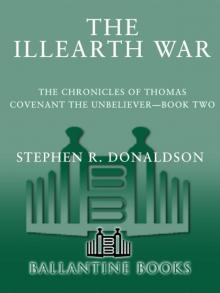 The Illearth War
The Illearth War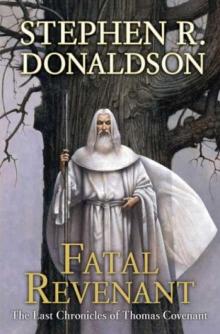 Last Chronicles of Thomas Covenant 02 - Fatal Revenant
Last Chronicles of Thomas Covenant 02 - Fatal Revenant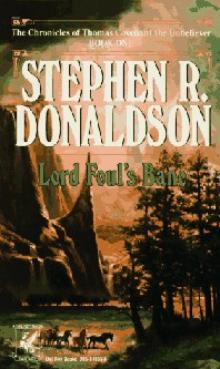 Lord Foul's Bane
Lord Foul's Bane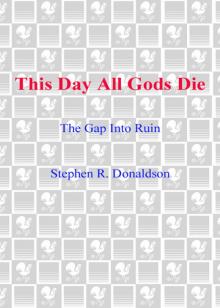 The Gap Into Ruin: This Day All Gods Die
The Gap Into Ruin: This Day All Gods Die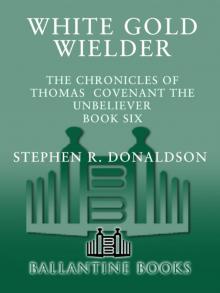 White Gold Wielder
White Gold Wielder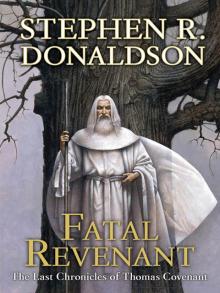 Fatal Revenant
Fatal Revenant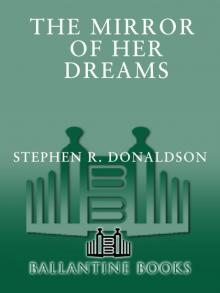 The Mirror of Her Dreams
The Mirror of Her Dreams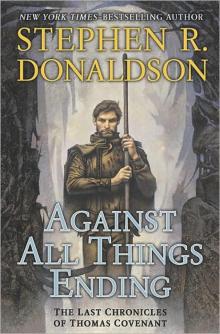 Against All Things Ending
Against All Things Ending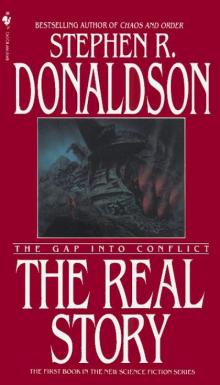 The Real Story: The Gap Into Conflict
The Real Story: The Gap Into Conflict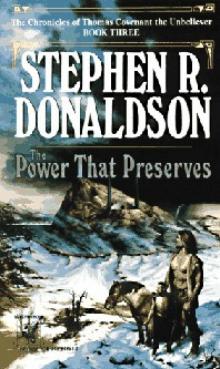 The Power That Preserves
The Power That Preserves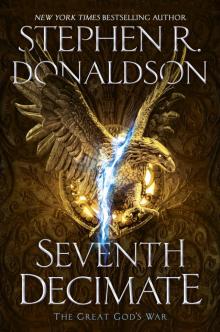 Seventh Decimate
Seventh Decimate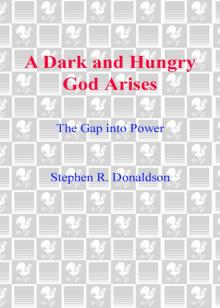 The Gap Into Power: A Dark and Hungry God Arises
The Gap Into Power: A Dark and Hungry God Arises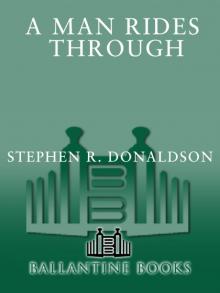 A Man Rides Through
A Man Rides Through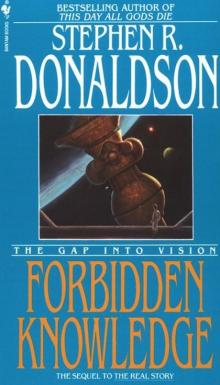 The Gap Into Vision: Forbidden Knowledge
The Gap Into Vision: Forbidden Knowledge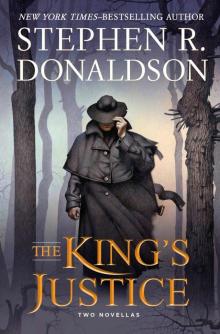 The King's Justice: Two Novellas
The King's Justice: Two Novellas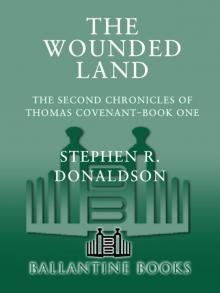 The Wounded Land
The Wounded Land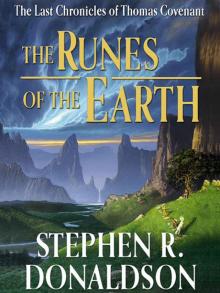 The Runes of the Earth
The Runes of the Earth Mordant's Need
Mordant's Need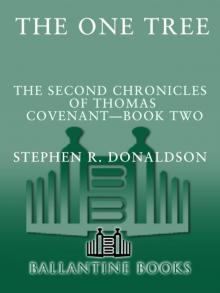 The One Tree
The One Tree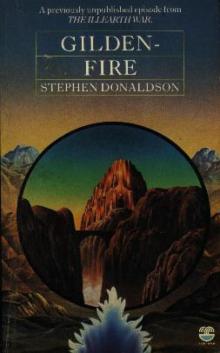 Gilden-Fire
Gilden-Fire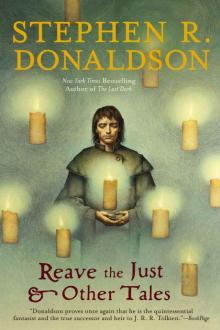 Reave the Just and Other Tales
Reave the Just and Other Tales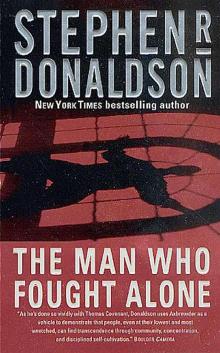 The Man Who Fought Alone
The Man Who Fought Alone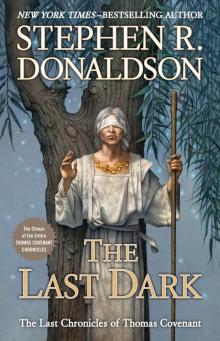 The Last Dark
The Last Dark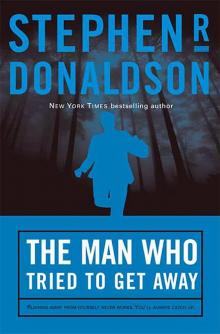 The Man Who Tried to Get Away
The Man Who Tried to Get Away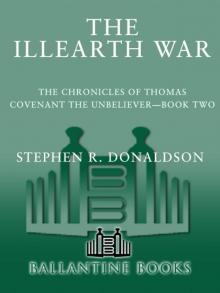 Thomas Covenant 02: The Illearth War
Thomas Covenant 02: The Illearth War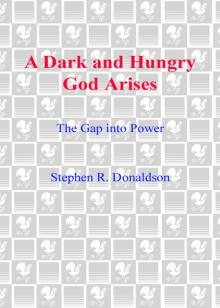 A Dark and Hungry God Arises
A Dark and Hungry God Arises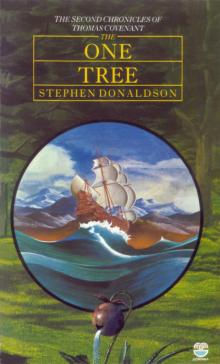 The One Tree t2cotc-2
The One Tree t2cotc-2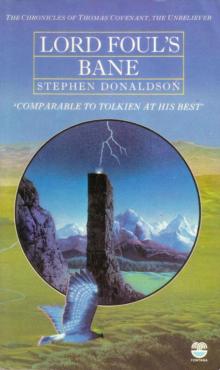 Lord Foul's Bane cotc-1
Lord Foul's Bane cotc-1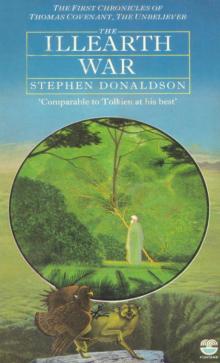 The Illearth War t1cotc-2
The Illearth War t1cotc-2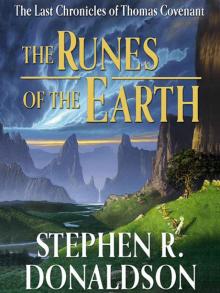 The Runes of the Earth: The Last Chronicles of Thomas Covenant - Book One
The Runes of the Earth: The Last Chronicles of Thomas Covenant - Book One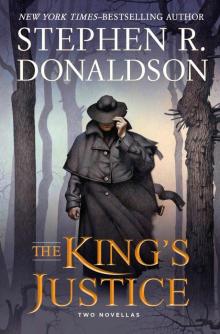 The King's Justice
The King's Justice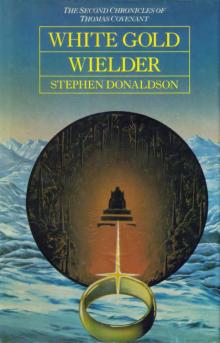 White Gold Wielder t2cotc-3
White Gold Wielder t2cotc-3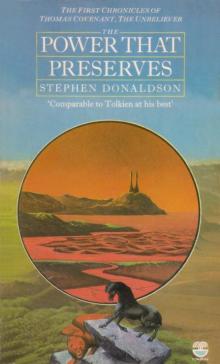 The Power That Preserves t1cotc-3
The Power That Preserves t1cotc-3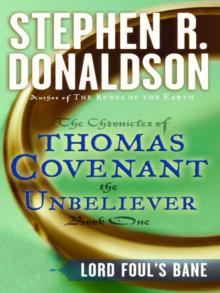 Thomas Covenant 01: Lord Foul's Bane
Thomas Covenant 01: Lord Foul's Bane Chaos and Order: The Gap Into Madness
Chaos and Order: The Gap Into Madness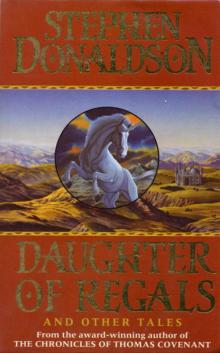 Daughter of Regals
Daughter of Regals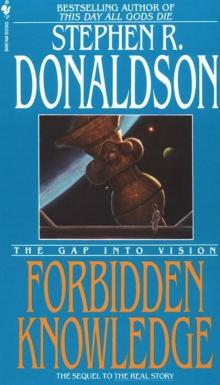 Forbidden Knowledge: The Gap Into Vision
Forbidden Knowledge: The Gap Into Vision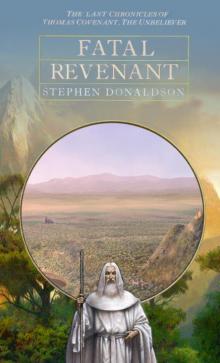 Fatal Revenant t3cotc-2
Fatal Revenant t3cotc-2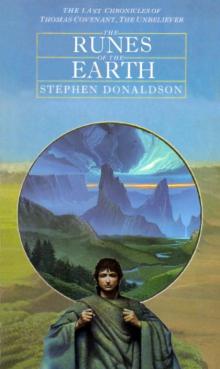 The Runes of the Earth t3cotc-1
The Runes of the Earth t3cotc-1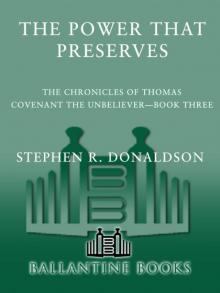 Thomas Covenant 03: Power That Preserves
Thomas Covenant 03: Power That Preserves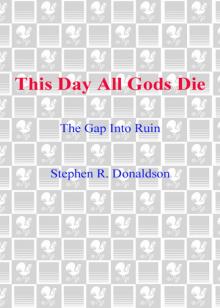 This Day all Gods Die: The Gap into Ruin
This Day all Gods Die: The Gap into Ruin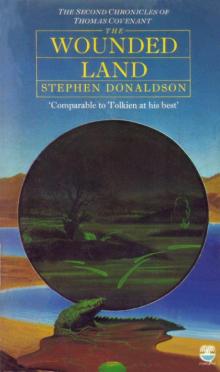 The Wounded Land t2cotc-1
The Wounded Land t2cotc-1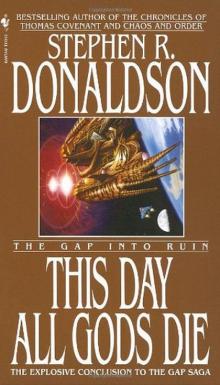 This Day All Gods Die
This Day All Gods Die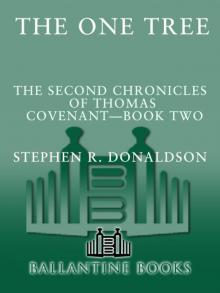 One Tree
One Tree